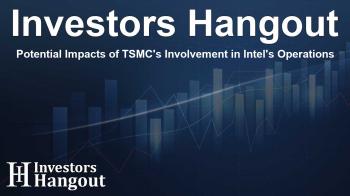Potential Impacts of TSMC's Involvement in Intel's Operations

Uncertainty Surrounds TSMC's Acquisition of Intel's Factories
The possibility of Taiwan Semiconductor Manufacturing Co. (TSMC) gaining control over Intel Corp.'s U.S. factories remains a topic of debate. Recent reports indicate that the Trump administration is unlikely to support foreign control of these critical manufacturing sites. This stance reflects broader national interests in maintaining robust semiconductor production within the U.S.
Understanding TSMC's Role in the Industry
As the leading chipmaker globally, TSMC has been exploring the idea of acquiring a controlling stake in Intel's manufacturing facilities at the request of former President Donald Trump. Although this initiative could bolster U.S. semiconductor capabilities, it raises significant questions about foreign control over essential tech infrastructure.
White House Perspective on Foreign Investment
A spokesperson from the White House emphasized the administration's openness to foreign investments in U.S. construction projects but expressed skepticism regarding a foreign company managing a significant American player like Intel. This reflects a delicate balance in promoting economic collaboration while safeguarding national interests.
Challenges TSMC Would Face
If TSMC were to obtain operational control of Intel’s facilities, the company would grapple with integrating its unique manufacturing processes with Intel's existing practices. Each semiconductor manufacturer has its specialized techniques, thus TSMC would need to adapt to Intel's methodologies or risk compounded operational inefficiencies.
Impact on the Semiconductor Landscape
The implications of such a takeover extend beyond Intel and TSMC; it touches on the broader semiconductor landscape. With the U.S. CHIPS and Science Act 2022 introducing substantial subsidies aimed at bolstering domestic semiconductor manufacturing, the administration is keenly aware of the ramifications of foreign control on these investments.
TSMC's Growth Strategy in the U.S.
Despite the uncertainties surrounding its potential acquisition of Intel, TSMC is pursuing aggressive expansion strategies within the U.S. The company has committed $65 billion towards new factory developments in Arizona, aligning with Taiwan's broader ambitions to enhance its technological footprint in partnership with the U.S.
Market Reactions to the Developments
Market analysts are closely watching these developments. Following recent news, Intel’s stock experienced a drop of 2.2%, while TSMC’s shares observed a slight increase. Analysts from prominent firms have issued ratings and price targets for both companies, reflecting diverse outlooks on their market positions.
Future Perspectives on Semiconductor Manufacturing
The ongoing discussions about TSMC and Intel are emblematic of a larger trend. As the semiconductor industry faces increasing demands and geopolitical pressures, the U.S. aims to fortify its domestic production capabilities. Ensuring that vital manufacturing remains within U.S. borders will continue to be a crucial focus of policymakers.
Frequently Asked Questions
What is the significance of TSMC controlling Intel's factories?
TSMC's control could enhance its production capabilities but may raise concerns about foreign influence over critical U.S. technology infrastructure.
How is the U.S. government responding to foreign investments?
The U.S. government is cautiously welcoming foreign investments while prioritizing domestic control over essential manufacturing facilities.
What challenges would TSMC face if it acquired Intel?
TSMC would need to navigate the integration of its manufacturing practices with Intel’s, which could be complex and resource-intensive.
What are the market predictions for Intel and TSMC?
Market analysts have varying predictions, with some anticipating potential growth for TSMC while others view Intel's position as vulnerable.
Why is domestic semiconductor production important?
Domestic production is vital for national security and economic stability, particularly in light of global supply chain disruptions affecting technology sectors.
About The Author
Contact Henry Turner privately here. Or send an email with ATTN: Henry Turner as the subject to contact@investorshangout.com.
About Investors Hangout
Investors Hangout is a leading online stock forum for financial discussion and learning, offering a wide range of free tools and resources. It draws in traders of all levels, who exchange market knowledge, investigate trading tactics, and keep an eye on industry developments in real time. Featuring financial articles, stock message boards, quotes, charts, company profiles, and live news updates. Through cooperative learning and a wealth of informational resources, it helps users from novices creating their first portfolios to experts honing their techniques. Join Investors Hangout today: https://investorshangout.com/
The content of this article is based on factual, publicly available information and does not represent legal, financial, or investment advice. Investors Hangout does not offer financial advice, and the author is not a licensed financial advisor. Consult a qualified advisor before making any financial or investment decisions based on this article. This article should not be considered advice to purchase, sell, or hold any securities or other investments. If any of the material provided here is inaccurate, please contact us for corrections.

